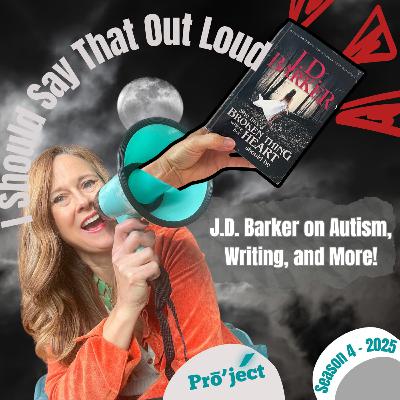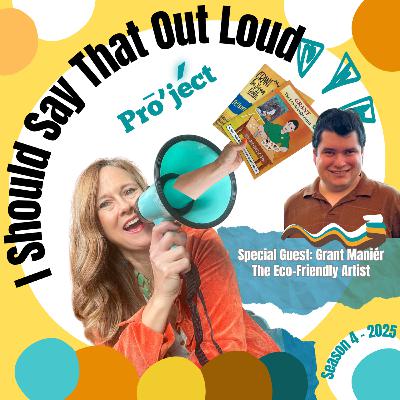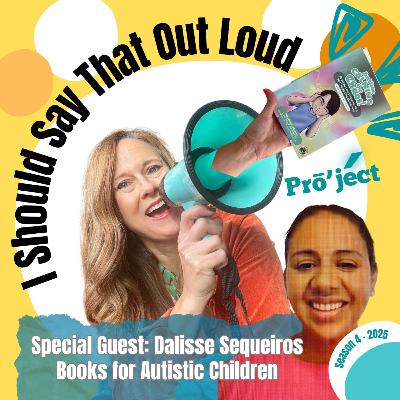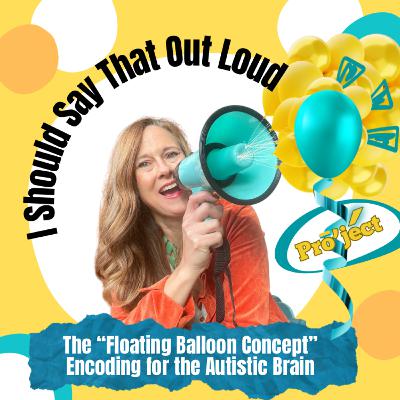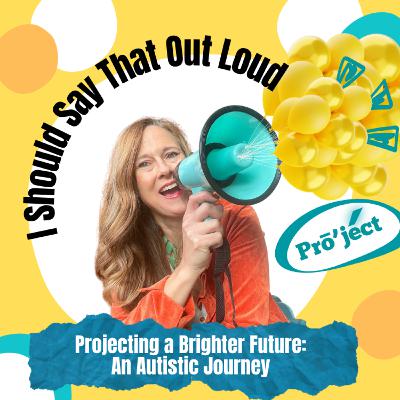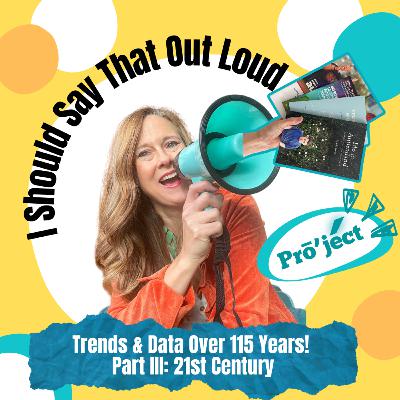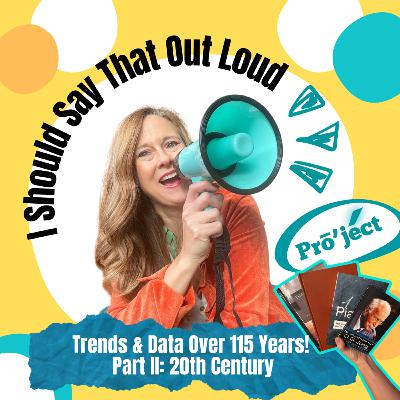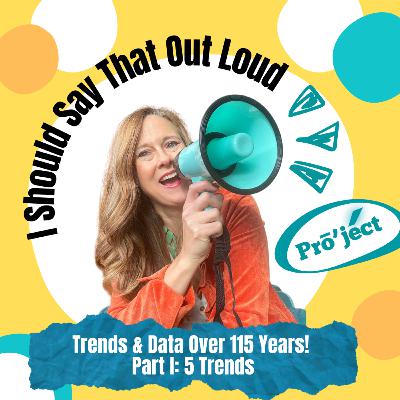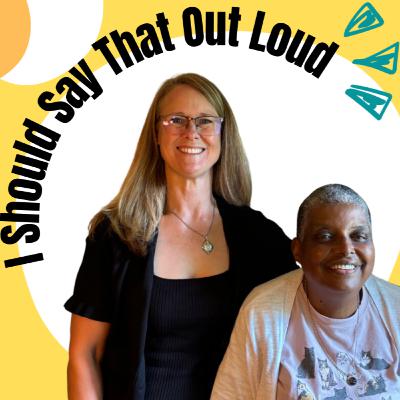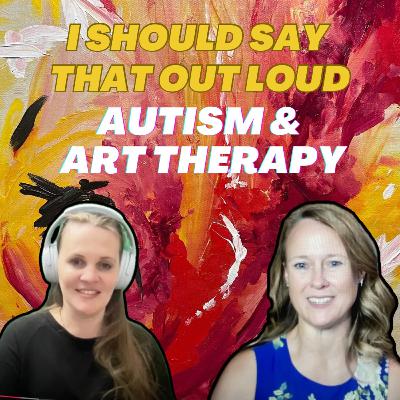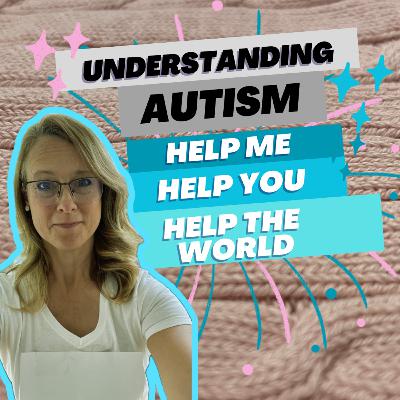Discover I Should Say That Out Loud
I Should Say That Out Loud

I Should Say That Out Loud
Author: Donna Brendel
Subscribed: 7Played: 82Subscribe
Share
© Donna Brendel
Description
When Donna Brendel was diagnosed with autism as an adult, the drive behind her passion for advocacy made more sense than ever. Her special interest is fighting for hurting people. She has a lot to say, and she's finally ready to say it out loud.
42 Episodes
Reverse
"Everything's a little scary until you understand it," is how J.D. Barker sums up the end of this incredible interview. In this episode of 'I Should Say That Out Loud,' host Donna Brendel engages in a deep conversation with bestselling author J.D. Barker about his journey as an autistic individual and how it has shaped his writing career. They explore the influence of Barker's Midwestern roots, the impact of autism on creativity, and the importance of structure in both writing and daily life. Barker shares personal anecdotes about his diagnosis, the challenges he faced, and the strategies he developed to succeed as a writer. The discussion also highlights the significance of reading, the business side of writing, and the encouragement for autistic individuals and their families to embrace their uniqueness and pursue their passions.J.D. is a true inspiration for anyone who desires to face their fears head on and overcome them, because he's done just that in so many instances. You will have much to chew on after listening, as J.D. will challenge, inspire, and encourage you, which is a scary endeavor. And well, that's what J.D. is best at, writing to bring about that emotional reaction that causes us to feel. Even when he talks about writing, he spurs an emotional reaction, and better yet, an encouraging and inspirational reaction. How amazing and wonderful is that!J.D.'s website: JDBarker.comChapters: 00:00 - Introduction to JD Barker and Writing Journey05:23 - Navigating Life with Autism09:57 - The Aha Moment of Diagnosis and Impact on Life and Career13:51 - The Role of Reading in Childhood and Beyond16:01 - Seeing Words in Color and Synesthesia19:09 - Exploring Character Development and Traits20:52 - Where Do Your Stories and Characters Come From?22:10 - Balancing Creativity and Business in Writing24:30 - Public Speaking - Overcoming a Huge Autistic Fear25:59 - The Emotional Connection to Characters26:42 - Writing Process and Daily Routine29:12 - The Balance of Structure and Creativity30:15 - Inspiration From Real Life31:06 - JD's Favorite Genre, the Thriller, Chasing the Emotional Reaction33:16 - The Impact of Reading on Personal Growth34:51 - The Plus Column of Autism - Focus, Creativity, Finishing Projects37:25 - Visualizing Characters and Settings38:09 - Seeing the World in Greater Detail39:33 - Communication: Verbally vs. Written41:06 - JD's Encouragement for Autistic Families42:41 - I See You, the Autistic Connection43:26 - The Idea of Writing a Memoir47:23 - Closing Thoughts and Future Works
In this engaging conversation, host Donna Brendel interviews artist Grant Maniér, who shares his journey with autism and how it has shaped his artistic expression. Grant discusses the therapeutic nature of his art, the materials he uses, and the messages he conveys through his work. He emphasizes the importance of finding joy, overcoming challenges, and using art as a means of communication. The conversation also touches on the impact of negative feedback and bullying, as well as the significance of storytelling in his art and books. Grant's positive outlook and motivation serve as an inspiration for others, highlighting that it's never too late to discover one's talents.Grant beautifully epitomizes what the best-selling author of "Flow," Mihaly Csikszentmihalyi has stated in his newest book "The Evolving Self." He explains that experiences, such that Grant has explained in this episode, "focus our whole being in a harmonious rush of energy, and lift us out of the anxieties and boredom that characterize so much of everyday life." Mihaly also says that, "any activity can do it," and Grant says that, "it's never too late to discover your talents."This is such great news for everyone, autistic and neurotypical, young and old, alike! Whatever your talent, whatever may bring you joy, be it cooking, reading, sports, enjoying nature, art, science, when you allow yourself to narrow your attention on that passion or talent, you can experience reduced anxiety and greater joy. May Grant's message be an encouragement to you today.Grant's Website: jigsawgrant.comInstagram: @jigsawgrantChapters:00:00 - Introduction to Grant Maniér and His Art01:39 - Understanding Autism and Its Impact on Art03:48 - The Art of Paper and Puzzle Pieces08:03 - Art as a Therapeutic Outlet09:10 - Watching People Appreciate Grant's Artwork10:09 - Grant's Process of Making Art11:57 - Grant's Inspiring Messages14:16 - A Beacon of Hope for Other Families17:25 - Perfectionism and Growth as an Artist18:31 - Art as a Language of Emotion20:24 - Stories Behind the Art22:18 - Overcoming Challenges and Bullying23:07 - Autism and Bullying aka Negative Feedback24:31 - Social Life and Friendships Through Art26:32 - Art as Communication27:32 - Conclusion and Where to Find Grant's Work
In this incredibly honest and vulnerable conversation, host Donna Brendel speaks with Dalisse Sequeiros, an author and digital specialist from Barcelona, about her journey as a mother of two autistic children and her mission to create children's books that provide representation and understanding of autism. They discuss the importance of social stories, anticipating changes, communication between parents, and building confidence in autistic children. Dalisse shares her experiences in writing and self-publishing her books, emphasizing the need for resources that help both children and parents navigate the complexities of autism. The conversation highlights the power of literature in fostering awareness and acceptance of autism in society. Dalisse and Donna also explore the challenges and joys of parenting autistic children, emphasizing the importance of acceptance, community support, and personal faith. They discuss practical strategies for navigating social perceptions of autism, coping with meltdowns, planning and communication, and balancing family responsibilities. The conversation also touches on the significance of trying new experiences and letting go of preconceived expectations as parents. Dalisse shares her personal faith journey and the role of prayer in her life, highlighting the interconnectedness of faith and autism. The discussion concludes with a focus on the importance of creating a positive environment for autistic children and the need for community support.Dalisse's new book, "Autism: New School Year" releases July 16, so order your copy on Amazon! All of her books are available in English, Spanish, and Catalan!!00:00 - Preview of Interview with Dalisse Sequeiros00:24 - Introduction to Dalisse Sequeiros03:52 - Navigating Autism: Personal Journeys08:41 - The Birth of Children's Books on Autism12:38 - Understanding Meltdowns and Emotions14:13 - Building Confidence Through Stories15:26 - Making Books So Our Kiddos Feel Seen and Understood16:28 - The Sweetest Mom Story - Filling a Need20:12 - The Books are Resources for Parents and Caregivers Too21:56 - The Global Autism Community and Connection23:50 - What Are "Social Stories" & Why Are They Helpful?26:30 - Visual Learning and Emotional Regulation29:37 - The Importance of Social Stories29:46 - The Importance of Anticipating the Unexpected32:26 - Understanding Anxiety and Self-Regulation33:37 - Preparing for New Experiences35:43 - Creating Resources for Autism Awareness37:25 - Creating a World Where Kids Don't Feel Bad About Autism41:38 - Balancing Family Life and Responsibilities45:13 - How Did You Develop Such a Beautiful Communication System?48:51 - Understanding Autism's Complexity50:02 - The Role of Faith in Parenting & Autism Diagnoses52:47 - Navigating Community and Support56:11 - Connecting with God: Faith and Autism59:03 - Communicating Faith to Our Non-Verbal Children01:01:27 - Autistic Family Outings - They're Important and Possible01:06:50 - Be the Parent that YOUR Kids Need01:09:28 - Empowering Through Resources and Community
In this episode, Donna Brendel explores what she calls the 'Floating Balloon Concept,' which illustrates the process of internalizing and encoding thoughts before projecting them outward through speech or the written word. She discusses the following concepts:- the challenges of grasping abstract ideas,- why memorization doesn't always work or stick, - the importance of personal experiences in learning, - and the role of the brain in communication,- the domino effect of learning, growing in confidence, creating boundaries, and better communication,- a plea to never give up on communication or your autistic loved one.The conversation emphasizes the need for patience and understanding, especially for individuals with autism, as they navigate their learning processes.Chapter Titles:00:00 - Projecting the Struggle of Autistic Communication02:54 - Introducing the "Floating Balloon Concept"07:28 - Why Memorization Doesn't Always Work08:50 - The Role of the Brain in Learning13:44 - Encoding, Grasping the Floating Balloon, & Anchoring it in Memory15:46 - Confidence Leads to Better Boundaries & Better Communication17:42 - Broca's - Wernicke's Area Grasping Communication Loop19:04 - The Brain, the Broca's-Wernicke's Engine, and Communication25:42 - People with Autism Need More Processing Time28:11 - Bringing Floating Balloons Within Reach32:48 - It Takes Patience, So Thank You in Advance!
In this mostly joyous while slightly emotional episode, Donna Brendel shares her journey as a late-diagnosed woman on the autism spectrum, focusing on the culmination of several of her projects this year. She focuses on the word project, specifically planning an undertaking, as she has been quietly doing for many years now, but is ready to say out loud and share her progress and continued goals. After waiting way too long for permission to do things she's wanted to do (that are an inherent right), she finally realized just how capable and smart she is and moved forward with several life goals. This can unfortunately happen for many people with autism when they are misunderstood and discounted for what they are capable of doing in life.She graduated with her first college degree with honors and awards, with plans to continue on this fall. She published her second book, continuing on in her seven-book "Autistic Revelations" memoir series, and she continues to plan for ever more advocacy efforts. She emphasizes the importance of understanding autism and integrating various aspects of life, such as play and education, into one's career. Donna also discusses her future goals, including public speaking and research, while encouraging listeners to engage with her work and support autism advocacy. She would like to thank all those who have come before her, all those who have joined her since she started, and all who will continue to move autism advocacy forward even against the wishes of those who think we need permission to stand up for ourselves. 00:00 - Celebration and Introduction01:05 - Understanding the Concept of 'Project: Planning an Undertaking'02:28 - Planning an Undertaking #1: Writing a Memoir Series05:14 - Planning an Undertaking #2: Advancing My Education08:27 - Integrating Life Experiences and Learning11:10 - Life Questions to Ponder14:37 - Planning an Undertaking #3: Cultivating Autism Advocacy17:27 - Planning an Undertaking #4: Research and Speaking24:40 - Sneak Peek, Farewell, and Bloopers
In this episode, Part III or her series on Autistic Trends and Data from the past 115 years, Donna Brendel delves into and intertwines insights from 21st century authors and researchers with the 20th century expert pioneers in Part II of this series. She starts with Ido Kedar's book and shares his beautiful and poignant voice after transforming from non-verbal to verbal through modern therapies and technology in autism. She defines autistic burnout through Jodie Clarke's book, how it relates to social exhaustion and depression, and how it is different and on another level at the same time. She discusses the evolution of autism understanding, the importance of communication, and emerging trends in autism therapy, emphasizing the need for a neuro-inclusive culture and the double empathy problem in interactions between autistic and neurotypical individuals through the book created by an incredible team at the Anna Freud National Centre for Children and Families. She shares the most recent data from the CDC on the prevalence of autism in America.Finally, she ties it all together with her personal experience of trial and error in self-care recovery and progress for herself and her family, and the fact that perseverance is important in trying many modalities of therapy until the right one if found for each child and adult on the autism spectrum. Chapters:00:00 - Part III: Trends & Data on Autism: Researchers & Autistic Voices From the 21st Century01:23 - Ido Kedar - on Finding His "Voice" Through New Autism Therapies11:41 - Navigating Autistic Adolescence, Anger and Sorrow16:11 - Motivation and Self-Acceptance in Autism22:11 - Autistic Burnout: Understanding and Addressing the Crisis27:14 - Collaborative Approaches: Improving Mental Health Services31:55 - Empowering Autistic Voices: Advocacy and Research39:01 - Trends in Autism: Data and Future Directions40:48 - Thoughts on Slowing Down, Cross-Body Therapy & Tying It All TogetherReferences used in Parts I, II, and III of this series:• Montesorri, M. (1912.) “The Montessori Method.” Frederick A. Stokes Company, New York.• Piaget, J. (1923 French, 1926 English, 1932 Second Edition, 1959 Third Edition.) “The Language and Thought of the Child.” Routledge, New York. • Gesell, A., M.D., Ph.D., Sc.D., (1945.) “The Embryology of Behavior.” Harper & Brothers Publishers, New York and London.• Jung, C. G., Dr., (1957, 1958.) “The Undiscovered Self.” Penguin Books, Ltd., London.• Kedar, I. (2012.) “Ido in Autismland: Climbing Out of Autism’s Silent Prison.” • Clarke, J. (2025.) “Stop the World I Want to Get Off: A guide to understanding and supporting the recovery of autistic burnout in children and young people.” Jessica Kinglsey Publishers, London.• Pavlopoulou, G., et al. (2025.) “Improving Mental Health Therapies for Autistic Children and Young People: Promoting Self-Agency, Curiosity and Collaboration.” Routledge Taylor & Francis Group, London and New York. • Autism and Development Disabilities Monitoring (ADDM) Network (2023.) “Community Report on Autism 2023.” Centers for Disease Control and Prevention.Congratulations to Donna Brendel and "I Should Say That Out Loud," for ranking number 5 on Feedspot's "25 Best Adult Autism Podcasts" based on relevancy, authority, social media followers and freshness.
In this episode, Part II of Trends & Data, Donna Brendel explores the origins of current trends by delving back to early 20th century experts and pioneers in teaching, child and adult psychology, and child development. She begins with the Montessori Method, discussing its historical significance and impact on education. She highlights the contributions of the pioneers of child psychology, Jean Piaget, and developmental milestones, Dr. Arnold Gesell, while pointing out Carl Jung's emphasis on the importance of understanding individuality in child development, particularly in the context of autism and neurodiversity. The conversation underscores the need for a more nuanced approach to child development that recognizes the unique trajectories of each child.Rounding out this series in just a few days, Part III, Researchers and Autistic Voices from the 21st Century, Donna will share beautiful and poignant progress from brave emergent researchers as well as autistic authors benefiting from new treatment methods. Autism has been around much longer than 115 years, and although progress has been painfully slow, we are finally making progress. Autistic voices are helping to PROJECT awareness, support, new research methods, and improved treatment modalities forward. It's a beautiful thing! If you haven't caught Part I yet, Five Current Trends in Autism, give it a listen while you wait for Part III to post.Congratulations to Donna Brendel and "I Should Say That Out Loud," for ranking number 5 on Feedspot's "25 Best Adult Autism Podcasts" based on relevancy, authority, social media followers and freshness.• Montesorri, M. (1912.) “The Montessori Method.” Frederick A. Stokes Company, New York.• Piaget, J. (1923 French, 1926 English, 1932 Second Edition, 1959 Third Edition.) “The Language and Thought of the Child.” Routledge, New York. • Gesell, A., M.D., Ph.D., Sc.D., (1945.) “The Embryology of Behavior.” Harper & Brothers Publishers, New York and London.• Jung, C. G., Dr., (1957, 1958.) “The Undiscovered Self.” Penguin Books, Ltd., London.• Kedar, I. (2012.) “Ido in Autismland: Climbing Out of Autism’s Silent Prison.” • Clarke, J. (2025.) “Stop the World I Want to Get Off: A guide to understanding and supporting the recovery of autistic burnout in children and young people.” Jessica Kinglsey Publishers, London.• Pavlopoulou, G., et al. (2025.) “Improving Mental Health Therapies for Autistic Children and Young People: Promoting Self-Agency, Curiosity and Collaboration.” Routledge Taylor & Francis Group, London and New York. • Autism and Development Disabilities Monitoring (ADDM) Network (2023.) “Community Report on Autism 2023.” Centers for Disease Control and Prevention.Footnote for 14:20-15:30In this segment, Donna Brendel is reading Jean Piaget's thoughts about autistic thinking. In her post-recording editing and follow-up research, she realized and wanted to be sure to highlight that Piaget's interpretation of the idea of autistic thinking in the 1920's was in a completely different context to what we mean when we speak of autistic thinking today in the 2020's. She will discuss this in more detail during her March episode. It's a fascinating nuance and revelation that has given her much food for autistic thought...Chapters for Part II00:00 - Part II: Trends & Data on Autism, Expert Thought Generators from the 20th Century02:05 - Insights from The Montessori Method06:05 - Considering the Influence of Two Thought Pioneers: Piaget & Gesell11:46 - Examining Child Thought with M. Jean Piaget's Writings19:00 - Moving to the Physical Aspect of Child Development with Arnold Gesell25:08 - Carl Jung's Insights on Individuality as Misrepresented in Research
In this episode, host Donna Brendel explores the importance of projecting autistic trends and data from both her perspective and personal experience, as well as from experts and other autistic authors going back 115 years!In this segment, Part I of a three-part series, she will delve into personal experiences and broader trends related to autism, neurodivergence, and burnout. She discusses the importance of living with margin, the need for workplace accommodations, and the value of neurodivergent perspectives. Additionally, she addresses challenges in daily living, shifts in perspectives on ABA therapy, and the current state of research in autism.Watch for Part II coming soon, Expert Thought Generators from the 20th Century, with insights and excerpts from important works by Dr. Maria Montessori, Jean Piaget, Dr. Arnold Gesell, and Carl Jung. Rounding out this is series, Part III, Researchers and Autistic Voices from the 21st Century. Donna will share beautiful and poignant progress from brave emergent researchers as well as autistic authors benefiting from new treatment methods. Autism has been around much longer than 115 years, and although progress has been painfully slow, we are finally making progress. Autistic voices are helping to PROJECT awareness, support, new research methods, and improved treatment modalities forward. It's a beautiful thing!Chapters for Part I:00:00 - Part I: Trends & Data on Autism from the Past 115 Years01:57 - Autistic Burnout - An Emerging Term, But Longstanding Trend08:06 - Trends in Reporting Autism in the Workplace14:17 - Challenges with Daily Living Activities18:26 - Exploring Alternative Autism Therapies to ABA21:53 - Autism Research Methods, We're Finally Getting SomewhereReferences shared throughout Parts I, II, and III of this series, in the order the are most thoroughly explored:• Montesorri, M. (1912.) “The Montessori Method.” Frederick A. Stokes Company, New York.• Piaget, J. (1923 French, 1926 English, 1932 Second Edition, 1959 Third Edition.) “The Language and Thought of the Child.” Routledge, New York. • Gesell, A., M.D., Ph.D., Sc.D., (1945.) “The Embryology of Behavior.” Harper & Brothers Publishers, New York and London.• Jung, C. G., Dr., (1957, 1958.) “The Undiscovered Self.” Penguin Books, Ltd., London.• Kedar, I. (2012.) “Ido in Autismland: Climbing Out of Autism’s Silent Prison.” • Clarke, J. (2025.) “Stop the World I Want to Get Off: A guide to understanding and supporting the recovery of autistic burnout in children and young people.” Jessica Kinglsey Publishers, London.• Pavlopoulou, G., et al. (2025.) “Improving Mental Health Therapies for Autistic Children and Young People: Promoting Self-Agency, Curiosity and Collaboration.” Routledge Taylor & Francis Group, London and New York. • Autism and Development Disabilities Monitoring (ADDM) Network (2023.) “Community Report on Autism 2023.” Centers for Disease Control and Prevention. Congratulations to Donna Brendel and "I Should Say That Out Loud," for ranking Number 5 on FeedSpot's "25 Best Adult Autism Podcasts" based on relevancy, authority, social media followers and freshness. Thank you FeedSpot for watching!
In this guest interview episode, Donna Brendel was privileged to spend an afternoon with Cindy Bentley. Cindy graciously, openly, and honestly shares her inspiring journey from a challenging childhood in foster care and institutions to becoming a world-renowned Special Olympics athlete and advocate for individuals with physical and intellectual disabilities. She discusses the importance of love, support, and faith in overcoming adversity, as well as the need for community engagement and resources for people with disabilities. Cindy emphasizes the significance of listening to children, treating everyone with respect, and the power of personal growth through sports and education.
Cindy knows the meaning of I Should Say That Out Loud's 2025 word of the year, "Pro'ject," and shouts it loud and clear through her life as well as her words, "I'm gonna be my own person at the end of the day."
Poignant quotes from Cindy:
"Young people need to have a voice."
"By the grace of God I've lived through this."
"I wanted to be challenged."
"What's an alarm?" (first day in her own place.)
"There's so many myths...I love reading, and people think people with intellectual disabilities don't even know how to read either."
"Get out of the fishbowl and get a job."
"I have my struggles. Every day I get up and thank God."
Chapters
00:00 - Introduction and Background of Special Guest, Cindy Bentley
02:02 - Beginning of Interview with Cindy Bentley
03:34 - Surviving Abuse and Trauma
06:43 - Institutionalized - It Was a Very Horrible Place
08:15 - Finding Faith and Overcoming Anger
09:50 - Growing Up in an Institution - I Didn't Have a Voice
10:53 - Teachers: Believe in Us, Challenge Us
14:26 - Moving from the Institution to a Group Home
18:19 - World Travel and White House Visits
24:03 - Cindy's Athletic Achievements and the Power of Forgiveness
26:09 - Autism and Intellectual Disability
28:34 - Group Homes and Community Services
31:03 - Her Own Apartment, With Cats, No Roommates!
35:28 - Discovering a Talent for Running and Joining Special Olympics
37:20 - "My Faith Saved Me Too"
39:14 - Emotional Therapy for People with Disabilities
40:53 - Cindy's Dedication to Prayer and Serving Others
46:33 - Overcoming Childhood Struggles Through Athletics
50:21 - Circle of Friends
52:07 - I'm Here to Teach (Until God is Ready for Me)
55:00 - The Good and Bad of Foster Care
01:01:44 - Cindy's Career Path
01:12:21 - Volunteering to Build Skills and Land Jobs
01:18:00 - I'm Not a Person Who Sits in the House
01:19:35 - So Many People Are Lost
01:24:00 - I'm Gonna Be My Own Person at the End of the Day
01:27:30 - Celebrating 40th Anniversary Out of the Center (De-Institutionalized)
01:30:02 - "Young People Need to Have a Voice"
In this episode, Donna Brendel introduces the fourth season of her podcast, focusing on the word 'project' as a central theme for the year. She discusses her personal journey with autism, the importance of communication, and how projecting thoughts and emotions can enhance relationships. Throughout the episode, she explores various definitions of 'project' and shares her plans for the year, including personal achievements and the significance of understanding "cognitive processing pain." Donna emphasizes the need for self-advocacy and the importance of projecting one's identity and emotions to foster better connections with others.
The first half of this episode is admittedly dry, according to Donna's own words, but the second half is amazing, fully of emotional examples that expound on the first half. The second half can stand alone, but if you can stay away for the first half, it will be even more poignant. You'll laugh more and cry more. Also, if you are listening to this on audio only, there are many pauses left in on purpose that will make much more sense in the video format. Sorry about that!
00:00 - Welcome to Season Four
00:51 - The Journey of Self-Expression
03:07 - Defining 'Project' and Its Many Meanings
15:23 - Plans for 2025: Episodes, My Thoughts, Book Reviews, & Guests
20:33 - New Term: Cognitive Processing Pain
27:55 - Perfect Example of Projecting: The Rant
32:02 - Tools for Projecting
35:35 - Importance of the Ability to Project in an Emergency
41:22 - Conclusion and Call to Action
In this heartfelt holiday edition, Donna Brendel reflects on her personal journey of understanding the true meaning of Christmas, emphasizing the importance of faith, friendship, and gratitude. She shares her experiences as an autistic person and how her relationship with Jesus has shaped her understanding of the holidays. Donna encourages listeners to connect more deeply with their loved ones and to express gratitude, drawing parallels between her prayer life and her interactions with family and friends.
00:00 The Meaning of Christmas
02:26 Faith and Friendship in Loneliness
05:25 Gratitude and Connection with Others
In this second Holiday Edition episode, Donna Brendel discusses the challenges faced by autistic individuals during social gatherings, particularly during the holiday season. She shares personal stories that illustrate the anxiety and discomfort that can arise in social situations, as well as strategies for making these experiences more enjoyable. Donna emphasizes the importance of familiar environments, healthy snacks, and preparation to ease social interactions, ultimately aiming to foster a more enjoyable holiday experience for everyone involved.
00:00 - Navigating Social Interactions During the Holidays
04:41 - Strategies for Social Engagement
09:58 - Creating Conversation Starters
15:06 - Crafting as a Social Tool
18:57 - Navigating Holiday Interactions as an Autistic Adult
In this holiday edition of "I Should Say That Out Loud," Donna Brendel shares insights on celebrating holidays as an autistic person and in an autistic family. She discusses the challenges of gift giving, the importance of creating inclusive family traditions, and the need to balance holiday activities with the sensory needs of autistic individuals. Donna emphasizes the value of patience, creativity, and self-care during the holiday season, encouraging families to enjoy each other's company and embrace new traditions.
Attention is the key word. Pay attention to yourself, your kids, and all the non-verbal clues and cues your children give you and you give yourself. Don't even look for words. You can learn so much more by watching the non-verbals, because many of us autistic family folk do not yet know how to "say that out loud" yet! And even when we are verbal, we can have a one-track mind, but still be open to new ideas that we aren't even aware that we would enjoy yet, simply because we haven't experienced them yet.
So spread your non-verbal detective eyes and ears wide to gather all the information you need to enjoy this holiday season and help yourself and the whole family enjoy all of the sensory aspects of the season, along with lots of time for rest and recovery from all of the sensory aspects of the season!!!
00:00 - Navigating Holiday Celebrations as an Autistic Person
06:11 - Creating Meaningful Holiday Traditions
In this engaging conversation, Donna interviews Jackie Schuld, ATR-BC, REAT, an autistic art therapist. Jackie shares her journey into art therapy, the importance of creative expression, and her experiences living abroad. She discusses her current sabbatical, the role of art in therapy, and her upcoming book project focusing on the joys of being autistic. Jackie also reflects on three of her books that Donna is excited to dig into, including "Grief is a Mess," "Making it Through Chemotherapy," and "Therapy Private Practice." Finally, she emphasizes the significance of self-care and encouragement in the mental health field. Donna and Jackie become fast friends through this deeply introspective conversation, yet their shared joy of life shines through.
Link to Jackie's website: https://www.jackieschuld.com/home
Link to Joy of Autism Essay Submission: https://lnkd.in/gc6hz2Hk
00:00 - Introduction to Jackie Schuld
06:15 - Jackie's Sabbatical and Creative Freedom
09:06 - The Role of Art in Therapy
12:12 - Exploring Artistic Expression
14:56 - The Joys of Being Autistic Book Project
17:54 - Jackie's Journey Through Grief and Art
20:51 - The Impact of Creative Work on Life
21:36 - Navigating Creative Paths and Naysayers
22:50 - The Pain of Writing and Personal Experience
24:50 - Grief and Its Unexpected Audience
25:48 - Starting a Private Practice in Mental Health
28:21 - Art Therapy's Role in Autism
33:38 - Living Abroad and Career Changes
37:59 - The Journey to Self-Discovery and Art
Donna Brendel, a late diagnosed autistic woman, shares her struggles with expressing her thoughts and ideas out loud. She introduces her podcast, 'I Should Say That Out Loud,' as a platform for herself and others to share their thoughts and experiences. Donna discusses her inspiration from other podcasters and YouTubers, such as Taylor Heaton, Jordan Peterson, and Justin Root. She outlines her plan to create a community where people can engage with each other and share their voices. Donna invites listeners to subscribe, comment, email, and potentially be a guest on her show.
She has decided to only "lightly edit" this episode so that you can see more of the real Donna and her thought processing moments. She naturally uses a lot of eye movement to access information and thoughts in her brain before she is able to put her thoughts together and speak them out loud. Even with verbal abilities, expressing thoughts and ideas can be challenging for individuals with autism, but having a platform like a podcast can provide a space for them to share their voices.
Drawing inspiration from other podcasters and YouTubers has helped Donna in developing ideas and strategies for content creation. Creating a community where people can engage with each other and share their experiences can lead to a better understanding and acceptance of autism, which is Donna's ultimate goal. Subscribing, commenting, and potentially being a guest on the podcast are ways for you, the listener to actively participate and contribute to the community.
Chapters:
00:00 Introduction: Struggles with Expressing Thoughts and Ideas
00:46 What My Show Is About
03:26 Discovering the Purpose of 'I Should Say That Out Loud'
05:58 One of My Favorites - Taylor Heaton, Mom on the Spectrum
07:36 One of My Favorite Thinkers - Jordan Peterson
08:35 My Newest Favorite, The Justin Root Show
09:22 I Am My Own Producer
10:35 How Stars Are Made Nowadays - Jordan Peterson & Dennis Quaid
12:40 Putting My Thinking Sweater On
15:27 Microscope (That's Me) and Macroscope (That's All of You)
17:17 Help Me Help You Help the World
20:10 Subscribe, Comment, and Email
24:11 Today's Question: Favorite Piece of Clothing, But Falling Apart
@MomontheSpectrum @JordanBPeterson @TheJustinRootShow
In this conversation, Autistic Friends, Donna (from USA @IShouldSayThatOutLoud ) and Orion (from Australia @orionkelly ) discuss how autism affects individuals physically, including the impact on self-care and the tendency to forget basic needs. They also explore the challenges of explaining special interests versus hobbies and the importance of understanding and acceptance from family and friends. The conversation highlights the need for increased awareness and understanding of autism's physical manifestations and the importance of advocating for better nutrition and overall well-being. They laugh and get serious and then laugh some more, and what better way to get through some difficult topics than with some laughter.
We'd love to hear how you relate to the topics of this conversation, in any of the Parts, 1-4. What else would you like to hear Donna and Orion discuss in their next conversation?
Chapters:
00:19 Discussing Orion's Book "Autism Feels...An Earthling's Guide"
01:07 Gently and Patiently Increasing Awareness & Understanding
02:24 Family & Friends Placing Neurotypical Expectations on Us
03:49 It's Your Responsibility to Learn About Your Autistic Loved-One
05:27 Harmful Comments by Pre-Enlightened Family & Friends
05:56 Sadly, No Quick Revelations of Understanding (by Family & Friends)
07:44 Making Friends & Gaining Acceptance Around the Planet
11:24 How Autism Affects Us Physically
13:01 A History of Un-Diagnosable Physical Manifestations
16:44 Advice for Healthier Outcomes Before the Snowball Effect Causes Bigger Issues
20:45 Physical Pain vs. Ache vs. Annoyance & the Difference in Autistic Reactions
21:23 Nutrition Needs & Struggles for Autistic Kids & Their Parents
22:30 Concluding Thoughts - Signing Off From Around the Globe
Autistic Friends Orion @orionkelly and Donna @IShouldSayThatOutLoud discuss several pages and topics from Orion's book "Autism Feels...An Earthling's Guide." There's so much more to share in a conversation between friends than can be fit into a book, including shared experiences between friends.
Orion discusses the importance of including autistic voices in parenting and the workforce. He emphasizes the need for professionals to have a better understanding of autism and the lived experiences of autistic individuals. Orion also highlights the challenges of self-care for autistic people who are deeply invested in their special interests. He compares and contrasts the concept of hobbies vs. special interests for the autistic community and explains how special interests are a form of therapy and regulation for autistic individuals.
Including autistic voices in parenting and the workforce can lead to better outcomes for autistic individuals. Professionals in fields such as criminal justice, mental health, and employment should have a better understanding of autism and the unique needs of autistic individuals. Special interests are an important form of therapy and regulation for autistic individuals. Autistic individuals may struggle with self-care when deeply invested in their special interests. The concept of casual hobbies can be difficult for autistic individuals to understand, as our special interests often consume our lives.
Chapters
00:00 Introduction and Friendship
00:20 Creating Better Outcomes Through Autistic Voices
00:55 Creating Better Outcomes through Autistic Voices
00:56 Mental Health and Suicide in the Autistic Community
03:00 Criminal Justice System Interactions for the Autistic Community
05:38 Misunderstanding Can Lead to Health Misdiagnosis in the Autistic Community
07:07 Intertwine Lived Experience Workforce & Parenting Supports
10:24 Greetings in an Autistic World
10:42 Understanding and Accommodating Autistic Individuals in Various Settings
13:20 Social Awkwardness & Unique Perspectives for Autistic Individuals
14:32 Special Interests vs. Hobbies for the Autistic Community
In this week's conversation, Donna Brendel (USA) introduces and interviews her friend from across the globe, @orionkelly Orion Kelly (Australia), a content creator, podcaster, author, and advocate for autism. They did into Orion's book, "Autism Feels: An Earthling's Guide" and page by page reminisce through shared experiences of childhood costumes, attachment to things, bullying, being sent to stay with family, the importance of alone time, how helpful key people were to integral to their lives, and parenting autistic children.
Coming up next week in Part 3...
In this part of the conversation, Orion and Donna will discuss the importance of having lived experience voices in parenting and the workforce. They emphasize the need for autistic individuals to be involved in helping parents raise their autistic children and in providing insights to professionals in various fields. They also highlight the significance of understanding and accommodating autistic individuals in settings such as criminal justice, mental health, healthcare, and employment. Orion shares his perspective on how autistic people can offer unique insights and contribute to better outcomes. They also touch on the topic of social interactions and how autistic individuals may have different default greetings and reactions to new people.
Coming up in two weeks in Part 4...
In this part of the conversation, Donna and Orion will discuss how autism affects individuals physically, including the impact on self-care and the tendency to forget basic needs. They also explore the challenges of explaining special interests versus hobbies and the importance of understanding and acceptance from family and friends. The conversation highlights the need for increased awareness and understanding of autism's physical manifestations and the importance of advocating for better nutrition and overall well-being.
Coming up sometime in the future...
Donna and Orion have barely scratched the surface of Orion's book. They have so much more to talk about, so watch for their next AFChLAG later this year... Autistic Friends Chatting & Laughing Around the Globe, that is...
Chapters:
00:00 Introduction and Digging into Orion's book, "Autism Feels: An Earthling's Guide"
00:58 Childhood Costumes
04:15 Attachment to Things
04:59 Bullying - It Never Ends
08:30 Being "Shipped Off" to Family
11:25 Autism Genetic Paternal Link and "Maternal Cocktail"
13:33 Alone Time - Getting Away to Breathe
15:41 But for These People...
17:30 You Just Need Someone to Believe in You
17:35 The Angry Parent Trap
18:13 When Our Kids Are Masking at School
20:33 When You're a Parent of an Autistic Kid
In this week's conversation, Donna Brendel (USA) introduces and interviews her friend from across the globe, @orionkelly Orion Kelly (Australia), a content creator, podcaster, author, and advocate for autism. They have a blast discussing their friendship, their experiences with autism, and the importance of sharing their stories. They also talk about their respective books and the challenges of writing and publishing. The conversation touches on themes of identity, resilience, and the power of connection. Have a laugh along with them, it's good for you!
Coming up next week in Part 2...
In this part of the conversation, Orion and Donna will discuss the importance of having lived experience voices in parenting and the workforce. They emphasize the need for autistic individuals to be involved in helping parents raise their autistic children and in providing insights to professionals in various fields. They also highlight the significance of understanding and accommodating autistic individuals in settings such as criminal justice, mental health, healthcare, and employment. Orion shares his perspective on how autistic people can offer unique insights and contribute to better outcomes. They also touch on the topic of social interactions and how autistic individuals may have different default greetings and reactions to new people.
Coming up in two weeks in Part 3...
In this part of the conversation, Donna and Orion will discuss how autism affects individuals physically, including the impact on self-care and the tendency to forget basic needs. They also explore the challenges of explaining special interests versus hobbies and the importance of understanding and acceptance from family and friends. The conversation highlights the need for increased awareness and understanding of autism's physical manifestations and the importance of advocating for better nutrition and overall well-being.
Coming up sometime in the future...
Donna and Orion have barely scratched the surface of Orion's book. They have so much more to talk about, so watch for their next AFChLAG later this year... Autistic Friends Chatting & Laughing Around the Globe, that is...
Chapters:
00:00 Introduction and Friendship
01:39 Discovering Autism and Parenting
03:26 The Power of Sharing Personal Stories
07:31 Navigating the Challenges of Writing and Publishing
12:08 Building Resilience and Finding Connection
In this episode, Donna Brendel shares her research on autism and developmental disabilities. She discusses the findings of the Autism and Developmental Disabilities Monitoring Network (ADDM Network) and highlights the increasing prevalence of autism in children. She also emphasizes the importance of outdoor recreation for children with disabilities and the benefits it provides for their physical and cognitive development. Donna encourages parents to get their children outside and seek support from communities like Mothers of Preschoolers (MOPS), now known as The MomCo.
00:00
Introduction and Background
02:44
Understanding the Prevalence of Autism
06:40
The Importance of Outdoor Recreation for Children with Disabilities
14:06
Supporting Children with Developmental Disabilities


